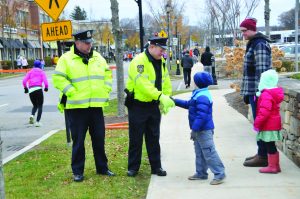Español Français Português عربى |

For law enforcement to be truly effective, officers and agencies must have the active assistance of and support from every facet of our communities. Establishing and maintaining these crucial relationships to build a mutual understanding and level of trust with diverse communities requires time and is an ongoing effort.
Unfortunately, in far too many of our communities there is a distrust of the policing profession. This is due to many factors, including historical racial inequity, and a small number of high-profile incidents that has tragically led to the reality that in some communities there is little expectation that the police will be there when called upon. This belief is both tragic and unacceptable.
It is for these reasons that I have made the mission of building, rebuilding, or maintaining community trust my top priority as IACP President. I know police leaders believe that building and rebuilding trust in our communities and around the world is something so critical that we cannot lose focus on it as our primary objective.
There is nothing more important to the success of policing than the trust of the public.
Simply stated, the IACP is committed to the principle that there is nothing more important to the success of policing than the trust of the public. Without the trust from our communities, law enforcement cannot effectively interact with individuals, carry out investigations, or prevent crimes. This goes to the roots of our profession. As Sir Robert Peel said in 1829, “The ability of the police to perform their duties depends on the public approval of the police existence, actions, behavior, and the ability of the police to secure and maintain public respect.” To that end, I am proud to announce the IACP Trust Building Campaign.
Through the Trust Building Campaign, the IACP is committed to addressing these, and other issues, on a national and international level. At its core, the IACP Trust Building Campaign seeks to enhance trust between communities and their law enforcement agencies. This will promote safe, effective interactions and ensure police agencies and communities have the collective capacity to prevent and reduce crime, and to improve the overall well-being and quality of life for all.
As part of its initial outreach in the coming months, the Trust Building Campaign will focus on providing several key resources to agencies.
First, it will include an agency self-assessment tool that will measure how agencies address six key focus areas that are essential to public trust.
These key focus areas follow:
- Bias-Free Policing
- Use of Force
- Leadership and Culture
- Recruitment, Hiring, and Retention
- Victim Services
- Community Relations
The goal of the assessment is to identify needs or gaps in an agency’s policies, procedures, culture, or practices. After completion of the assessment, agencies will be asked to join the Trust Building Campaign.
Like IACP’s “One Mind” campaign on mental health, agencies who join the Trust Building Campaign will pledge to implement policies and leading practices designed to close the gaps or needs identified by the self-assessment and continually work to enhance the trust and collaboration between a police department and its community.
To assist agencies in this effort, the IACP has already identified, within each core area, a wide array of existing resources that agencies can use to address gaps and enhance the trust and collaboration between a police department and its community. This resource library includes
- specific model policies that agencies can adopt,
- suggested leading practices for community-police engagement, and
- new approaches and enhancements to traditional law enforcement training.

However, the IACP has also identified several areas where resources are either outdated, insufficient, or nonexistent. In these areas, we will look to our committees and sections to develop, or assist in developing, these resources. In addition, as the Trust Building Campaign evolves, we will also look to our committees and sections for guidance and suggestions on new items that should be added to the self-assessment tool or resource materials.
Finally, as the Trust Building Campaign gets underway, I urge all agencies to review the resources that are currently available on the Trust Building Campaign page of the IACP website (www.theiacp.org/resources/document/trust-building-campaign), which provides policy considerations and tangible strategies to support police and communities in their efforts to engage in productive dialogue, form strong partnerships, and identify meaningful solutions.
It is incumbent upon us as police leaders to continue to reevaluate, recommit, and renew our focus on sustaining trusting relationships with all segments of our communities. The IACP Trust Building Campaign will provide every agency with a chance to assess its current status, identify areas for potential change, and allow them to take the steps necessary to strengthen the vital relationship with their communities.d


